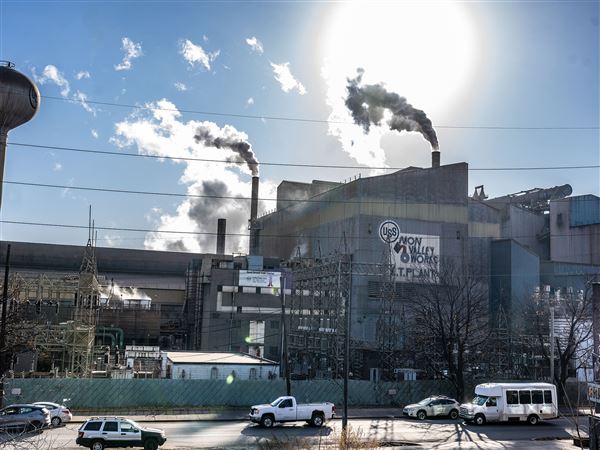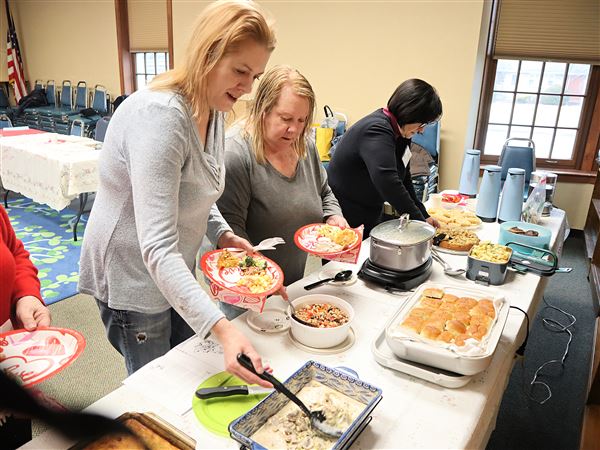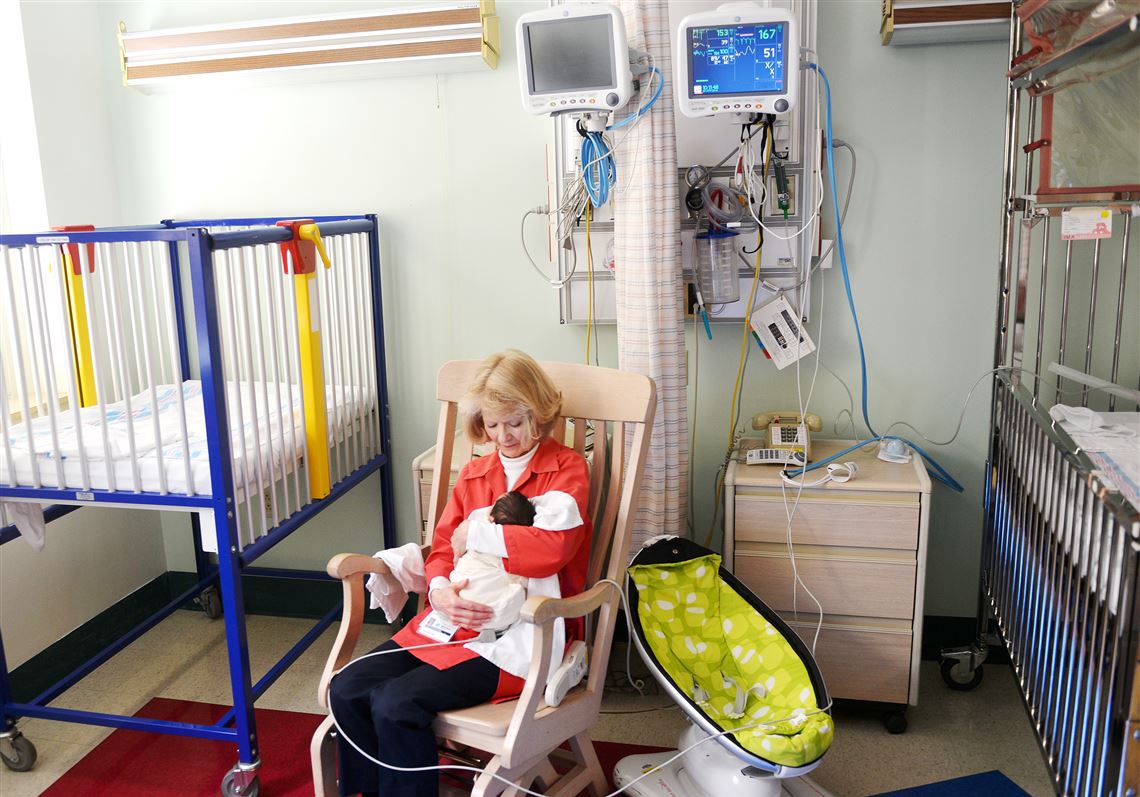The lights are off in the hospital room.
The only sound is the regular, electronic beeping of monitors tracking vital signs — and the telltale, high-pitched cry of a baby going through withdrawal.
The baby boy is one of three infants on this warm April afternoon at West Penn Hospital in Bloomfield who was born with neonatal abstinence syndrome, the term for infants whose mothers were using opiates during their pregnancies.
Dr. Giovanni Laneri, a neonatologist and Director of the Newborn Nursery at West Penn, picks up the tiny baby and gently speaks to him to soothe him.
“Come on, buddy,” he says to the 18-day-old baby, whose cries quickly subside as he is in the doctor’s arms.
“You’re very cute,” says Dr. Laneri, one of the hospital’s lead physicians in caring for babies born to mothers who were using drugs during their pregnancies.
“We don’t say that babies are addicted. We never use that word for babies. We say babies are dependent on the substances that the mom was using while she was pregnant,” Dr. Laneri explained.
As officials in Pennsylvania and elsewhere try to battle a rising tide of opioid use, they are also grappling with how to aid the epidemic’s tiniest victims.
“As Pennsylvania and the country deals with the opioid crisis, this is something we are going to have to deal with,” said Pennsylvania Human Services Secretary Ted Dallas. “There are all kinds of echoes or aftershocks to this crisis that government is trying to deal with.”
The data in Pennsylvania on babies born with neonatal abstinence syndrome is limited. The only available statewide statistics are from women who are enrolled in Medicaid; the numbers don’t cover women with private insurance.
Still, even this segment of data shows a troubling trend. In 2010, 1,081 infants in Pennsylvania were diagnosed with neonatal abstinence syndrome, out of the more than 65,000 infants born onto Medicaid. By 2014, that number had grown to 1,970 babies out of 64,001, or more than 3 percent.
Dr. Richard Beigi, vice president of medical affairs and chief medical officer at Magee-Womens Hospital of UPMC said based on regional hospital admissions data, he estimates 4 to 7 percent of pregnant women suffer from this during their pregnancies, speaking in May before U.S. Senator Bob Casey toured the Pregnancy Recovery Center at Magee.
“At any given time, to bring the numbers down to the complete local level, we may have around five to ten babies in our unit that are being treated for withdrawal,” said Dr. Jennifer Kloesz, medical director of the Neonatal Intensive Care Unit at Magee. “In addition, we have another five to ten babies that are being observed and monitored for withdrawal symptoms, until we see if they get to the point where they need medication to get them through.”
“It really affects the baby in just about every system. It starts with irritability. They don’t sleep well ... they hold their muscles, hold their arms and their legs very tight. ... Because of all that, they don’t feed well. And they have a lot of malabsorption, which means they have a lot of diarrhea. And because of that, they have a sore bottom. And that makes them more irritable. ... And sometimes they get to the point where they cry all the time. They are very difficult babies to take care of.”
That’s where Patty McGonigle, of West View, comes in.
Ms. McGonigle has been a volunteer baby cuddler at West Penn since 2009, when she saw a notice in her church bulletin about the need for volunteers.
She has been coming twice a week since.
“Just hold them. Make them feel secure. Soothe them. Make them feel calm. If they are really fussy, calm them down,” she said, explaining her routine on a recent visit, while holding a black-haired baby girl.
Ms. McGonigle has held dozens, if not hundreds, of tiny babies over the years. She doesn’t know their names, or what kind of lives they will go go on to live, so she tries to stay focused in the moment, she said.
“The ultimate [goal] is to send them home healthy. By holding them, and calming them and soothing them, they feel that love. It helps them to grow.”
A baby born with NAS can go on to be perfectly healthy.
“We have no reason to believe that these kids can’t be 100 percent normal, functional, productive, wonderful kids,” said Dr. Elizabeth Krans, a Magee obstetrician-gynecologist and a researcher focused on optimizing healthcare services for drug-dependent pregnant women.
Dr. Krans works with pregnant women at Magee’s Pregnancy Recovery Center, which provides medication-assisted treatment to pregnant women, along with social services and counseling. She said she doesn't want increased media attention on opioid issues to add to the stigma of pregnant women with an addiction.
“There’s no reason that with appropriate treatment, both moms and babies can’t live completely normal functional lives,” said Dr. Krans.
Cathleen Palm, founder of the Center for Children's Justice, a group that works to prevent child abuse, has advocated for the state to collect better data and focus more on this population — pregnant women and their children -— when considering responses to the opioid crisis.
“We think we have to be focusing on this as a public health issue, versus a child abuse or a child protection issue,” she said, and making sure women have access to needed supports and services.
“Taking a baby home is a really intimidating process for any of us, but now you throw in recovery, you throw in a baby who is still maybe fussy ... there is some real vulnerability here for the mom, and for the baby. ... If Mom doesn't have drug treatment, and Mom doesn't have stable housing, we are stacking the deck against Mom and the baby.”
Kate Giammarise: kgiammarise@post-gazette.com or 412-263-3909 or on Twitter @KateGiammarise.
Read OVERDOSED: How doctors wrote the script for an epidemic. Email the team at overdosed@post-gazette.com, and read the OVERDOSED blog for more on the Post-Gazette’s investigation, readers’ stories, and the latest news about the drug epidemic.
First Published: June 5, 2016, 4:00 a.m.

















